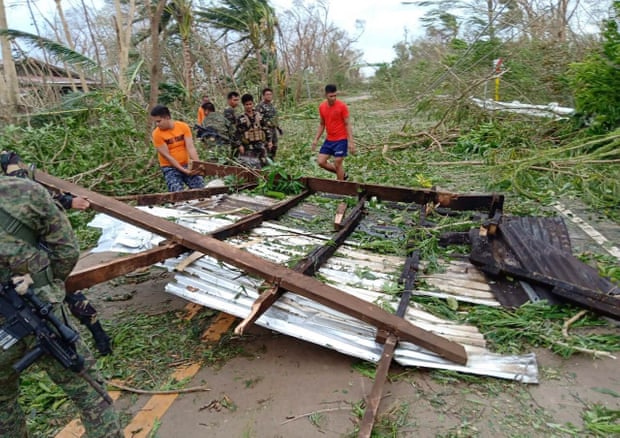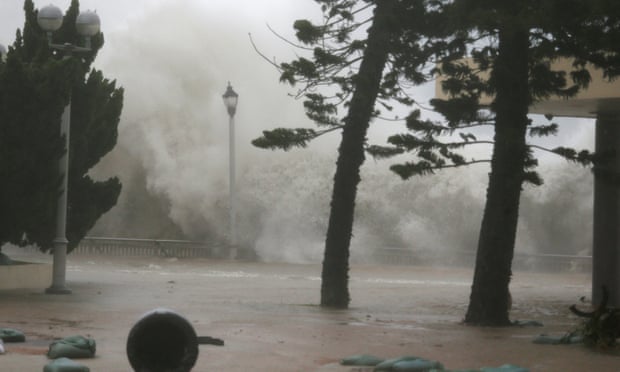Typhoon Mangkhut heads for China as dozens killed in Philippines
Hong Kong puts city on highest alert as roofs are torn off and storm surges lay waste to waterfront
- Search for survivors in Texas as storm Harvey heads north
- Slow-Moving Hurricane Harvey Causes Massive Destruction in Texas
Typhoon Mangkhut killed at least 30 people in the Philippines as it obliterated homes and crops and caused massive flooding, and is now on course to plough into China’s southern coast.
Presidential adviser Francis Tolentino said the heaviest casualty was recorded in the mountainous Cordillera region in northern Luzon, where heavy rains caused landslides that left 24 people dead and 13 more missing. Four others – including two children – were buried in a landslide in Nueva Ecija, another in Kalinga, and one person was killed by a falling tree in Ilocos Sur, Tolentino said.
 |
| Rescue workers clear debris from the road after Typhoon Mangkhut swept through the Philippines. Photograph: Armed Forces of the Philippines |
The storm, which was the strongest the region has seen this year, was not as ferocious as feared, though due to the remote areas where the typhoon hit, the full death toll and extent of the destruction is still unknown.
By Sunday morning, it was hurtling towards China’s heavily populated southern coast with winds of 177km/h (110mph). In Hong Kong, where the huge storm is expected to skirt just 100km (62 miles) south of the city, officials raised the storm alert to a T10, its highest level. Businesses have been boarded up and most flights cancelled.
Residents have been advised to stay indoors and away from windows or doors, and some have been evacuated from low-lying areas. High winds have already smashed windows, torn off parts of buildings and roofs, while storm surges have flooded hotels and restaurants.
In Guangdong, schools have been closed until Tuesday and the high speed rail has been suspended, according to China’s state news agency Xinhua. In the southern province of Fujian, Chinese officials have ordered thousands of fishing boats to return to harbour and closed construction sites near the coast.
 |
| High waves hit the shore at Heng Fa Chuen, a residental district near the waterfront, as Typhoon Mangkhut slams Hong Kong, China, on Sunday. Photograph: Bobby Yip/Reuters |
In the Philippines, President Rodrigo Duterte flew to Cagayan on Sunday with top government officials. He said: “I share the grief of those who lost their loved ones. Those [are what] we call the unforeseen events. In insurance, this is an act of God. I don’t know how it can be an act of God, but that is the term used by the insurance,” Duterte said in a televised briefing. Duterte said he would fly to the Cordillera region on Monday.
Tolentino said the search and rescue operation had now ended and that the focus would switch to “rehabilitation” and the restoration of power and water supplies.
The category 5 “super” typhoon hit the northern end of the Philippine island of Luzon early on Saturday morning, with the high winds ripping the roofs off houses and pulling down trees and electricity pylons, and the rains causing fatal landslides and flooding. More than five million people were in its path.
The island is a key agricultural area in the Philippines, producing most of the country’s rice, corn and others vegetable crops, and the storm left them ruined a month before harvest, damaging the livelihoods of thousands in the region.
Jerome Balinton, a spokesman for Save the Children who was on the ground in north-eastern Luzon, said: “The further north we travelled the more extensive the damage, particularly in Cagayan province. House after house had been flattened or badly damaged, with roofs or walls missing. Large trees have been uprooted from the ground and power poles bent right over, leaving power lines strewn across the ground.”
He added: “In some areas where the eye of the storm hit, it seems as if nothing has been left undamaged.”
The typhoon affected 250,000 people in Luzon, according to the government’s natural disaster council. Mangkhut, a Thai word for the mangosteen fruit, is the 15th storm this year to batter the Philippines.
After Hong Kong, Mangkhut will pass the Chinese gambling enclave of Macau, which has closed all of its 42 casinos for the first time and sandbagged businesses after flood warnings.
The typhoon is due to hit the Chinese province of Guandong by Sunday afternoon, where nearly half a million people have been evacuated from seven cities.

